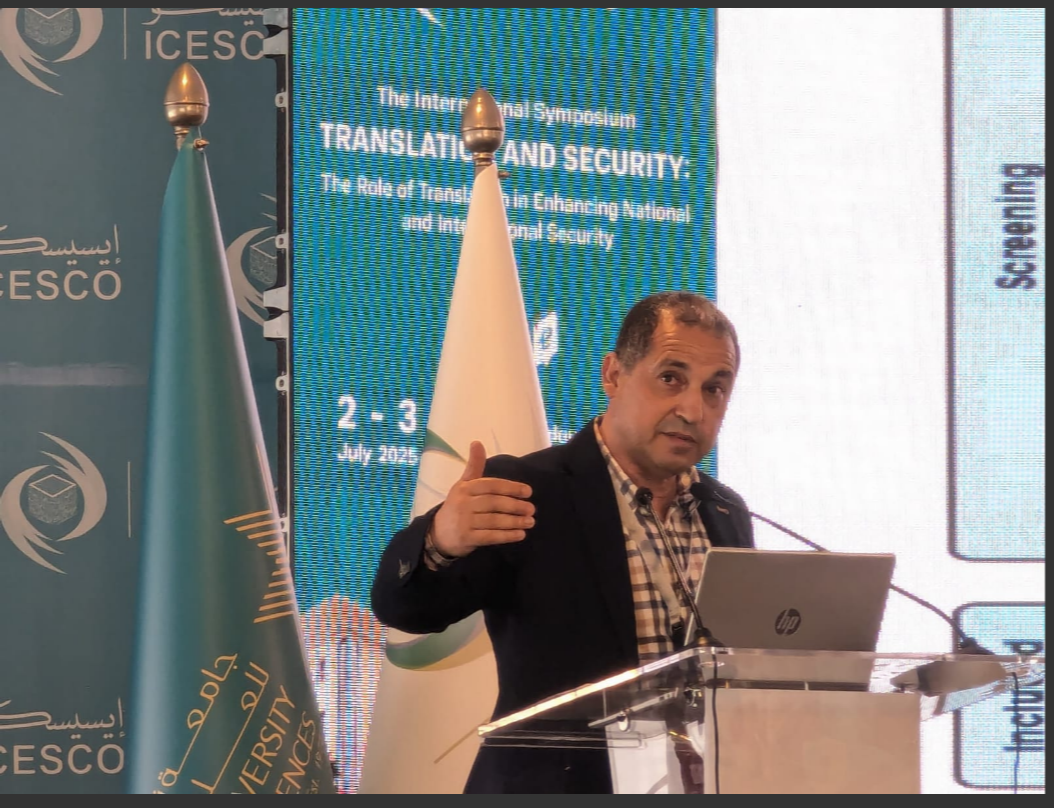The course is initially given in Arabic, but a new version in English will be available in next few days. Although the presentation is is in Arabic , the course activities and case studies as well as demonstrations are in English.
The course will be advertised sometimes this week for people who are interested in registering . There are fees to be paid either to assist to the live webinar or buy, later on, a registered video copy.
I Also have an old version (2010) of the same topic which I presented to a group of over 40 students online in collaboration with ATIDA :
Arabic Translation and Intercultural Dialogue Association - ATIDA
which was successful. The new version is mode detailed and elaborated than the previous either in terms of contents or teaching/training methodology.
THE NEW VERSION
ممارسة الترجمة الحرة و المستقلة عبر الانترنت
|
||
Description
خلال ساعة من
المحاضرة / الورشة سوف تأخذ (عزيزي الطالب)نظرة عامة حول طبيعة الترجمة الحرة و كيفية مزاولتها
وممارستها عبر الانترنت من منزلك...فالبداية صعبة في كل مبادرة... لكن هذا العرض
التطبيقي و الواقعي الذي سوف يتم عرضه هنا سوف يساعدك على مزاولة خدمات الترجمة الحرة...وبالتوفيق للجميع.
This content was created by Fouad El karnichi.
This content was created by Fouad El karnichi.
Target
audience
توجه هذه الورشة
إلى أي شخص يرغب ممارسة مهنة الترجمة الحرة والعمل من المنزل ، سواء تعلق الأمر بالطالب الجامعي الذي بدرس ميدان الترجمة
أو تعلق الأمر بموظفين آخرين أو بوكالات الترجمة غير الافتراضية والكلاسيكية والتي
تريد أن يتعلم موظفوها كيفية الولوج في مسار الترجمة الحرة وإدراج هذا القطاع ضمن
باقي الخدمات التي يقدمونها على الأرض وفي نفس البلد
Learning objectives
الأهداف التعليمية:
مع نهاية المحاضرة و الورشة سوف يكون المتدرب قادرا على بداية تدبير خدمات الترجمة
على منصة بروز دوت كوم أو غيرها من المنصات وتسيير مكتبه أومكتبها الافتراضي بثقة
و التواصل مع و الا حتكاك بالزبون أو تسويق الخدمات الترجمية وتنظيمها
ووضع الأثمنة المناسبة وأخلاقيات الخدمة.
Prerequisites
اللغات :العربية
و الأنجليزية
بعض النصوص و الروابط المختارة لتعزيز التعلم وصقل الكفاءات خلال هذه الورشة متوفرة باللغتين العربية و الأنجليزية
بعض النصوص و الروابط المختارة لتعزيز التعلم وصقل الكفاءات خلال هذه الورشة متوفرة باللغتين العربية و الأنجليزية
Program
الجزء الأول
ما معنى الترجمة الحرة أو الاشتغال كمترجم مستقل من المنزل؟ هل أنا مستعد وهل لدي القابلية لمزاولة هذا النوع من الخدمة؟ وهل أنا مستعد للتعلم والصبر والاستفادة من تجاربي وتجارب الزملاء الآخرين حين أبدا العمل كمترجم ومقدم خدمات الترجمة في العالم الافتراضي واقع الترجمة الحرة في العالم العربي ونختم هذا الجزء باستعراض مباشر له لكيفية فتح ملف على صفحة بروز دوت كوم لبناء مشروع مكتب ترجمة شخصي على الويب و كيفية استخدامه للدخول و الاحتكاك مع مقدمي خدمات الترجمة و اشياء اخرى تنفع المترجم الناشئ في تطوير مهاراته الترجمية المتعلقة بعالم الترجمة الاحترافي.
الجزء الثاني
ما معنى الترجمة الحرة أو الاشتغال كمترجم مستقل من المنزل؟ هل أنا مستعد وهل لدي القابلية لمزاولة هذا النوع من الخدمة؟ وهل أنا مستعد للتعلم والصبر والاستفادة من تجاربي وتجارب الزملاء الآخرين حين أبدا العمل كمترجم ومقدم خدمات الترجمة في العالم الافتراضي واقع الترجمة الحرة في العالم العربي ونختم هذا الجزء باستعراض مباشر له لكيفية فتح ملف على صفحة بروز دوت كوم لبناء مشروع مكتب ترجمة شخصي على الويب و كيفية استخدامه للدخول و الاحتكاك مع مقدمي خدمات الترجمة و اشياء اخرى تنفع المترجم الناشئ في تطوير مهاراته الترجمية المتعلقة بعالم الترجمة الاحترافي.
الجزء الثاني
بداية تاسيس وتفعيل خدمات مكتب الترجمة على الانترنت - المكان ولوازم التسويق - الاختصاص - تحسين المهارات - تدبير الوقت أثناء العمل من المنزل كمترجم حر - الأثمنة والتفاوض -الجودة في تقديم الخدمات - العلاقات مع العملاء ووكالات الترجمة.
وتهدف إلي تقديم المتدرب إلى عالم الترجمة الحرة عبر الإنترنت وشروط الالتحاق به ولوازمهالاحترافية، وكذا تعليمهم كيفية بناء مشروع الترجمة الحرة وتأسيس المكتب وتسويق الخدمات وتنظيمها ووضع الأثمنة المناسبة وأخلاقيات الخدمة



